My review of the UAB
Between February and June 2015, I studied at the UAB’s translation and interpretation department as part of my year abroad. During that period, I studied Spanish to English translation; Introduction to English to Spanish translation; French language for translators; specialised translation, and the history of translation. In this post, I am going to talk about some of my experiences (good and bad) as a student and resident at this university. Hopefully it will be useful to anyone considering studying there as an international student!
Accommodation
The Bella Terra campus is about 35 minutes from Barcelona’s Plaza Catalunya by the FGC train; the journey is really easy and cheap, especially compared to British rail fare prices. Jump on the S2 or S55 from Bella Terra station or the Universitat Autónoma and it will take you directly to the city. The only drawback is that unlike the centre’s metro system, which runs until about 2am, trains stop before midnight; this means either setting yourself a time limit, or getting the night bus back if you want to stay out in the city until the early hours. Another option would be to just stay out until the first train of the morning, but I am nowhere near hardcore enough to try that!
From Bella Terra station, the campus is only a ten-minute walk straight up the hill. The fact that it is impossible to get lost worked very much in my favour. There are four options for accommodation, three of which include sharing a flat with several people, and sharing a room with at least one. Now, sharing a flat is one thing, but I am an only child and have never shared a bedroom – I wasn’t going to start at 21 years old! Therefore it was the fourth option, Type D, that I went for; this meant I had a small flat to myself. At the time of application, it did say this option wasn’t available, but I put it anyway, and got lucky!
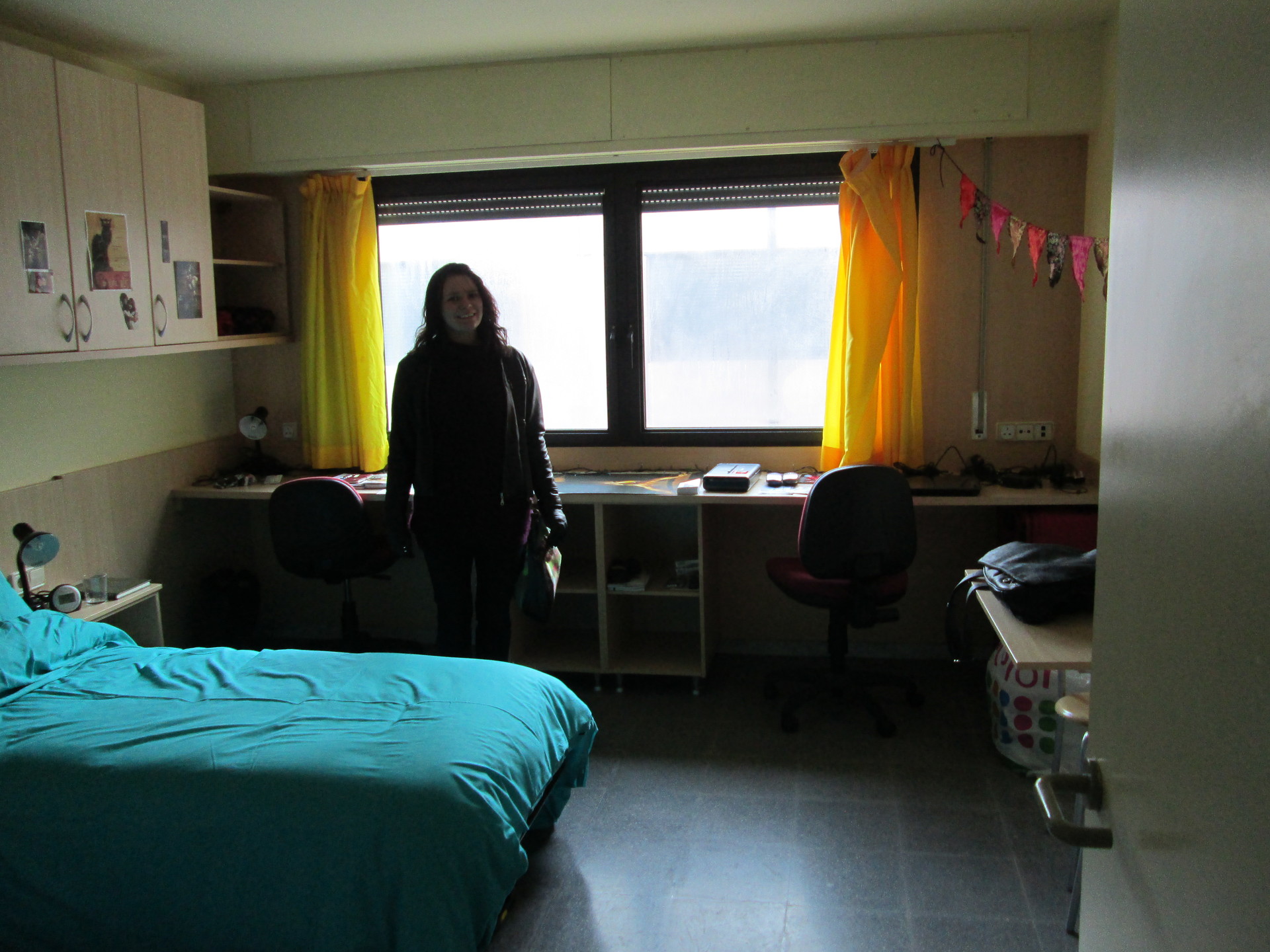
(Halfway through decorating my room! )
In theory, the flat was supposed to be able to fit two people, but I have no idea how. It was, however, very comfortable for one person: a cosy kitchen, a bathroom with a shower, and a large bedroom with two single beds. It was one of my favourite accommodations of my student life; I also discovered that I loved living alone. I had neighbours, and we were friendly when we ran into each other in the hall, but for the most part I lived in the peace and quiet of my own company; after living with a family in Lima, the solitude felt like a luxury. Within thirty seconds of my flat, I had a surprisingly well-stocked corner shop and two café-bars; a great launderette was situated about a two-minute walk across the square. The corner shop had all the student-staples (Ben and Jerry’s ice cream, instant noodles, oven pizza – despite my flat not containing an oven), as well as necessities like tinned vegetables, cereals, 60-cent cans of Estrella, 11-euro bottles of Stolichnaya vodka, and Heinz baked beans. The latter came in particularly useful when I came down with a cold, and there was instant mash, beans and ketchup to hand – you can take the girl out of England, but you can’t quite take the England out of the girl.
You might think it strange to get excited about a launderette, but I loved it. Industrial-sized washing machine get your clothes clean in good time, whilst equally big and shiny tumble dryers leave everything warm and fluffy. The bars, Frankfurt and El Cau, are fairly similar to each other, with El Cau being slightly fancier. The latter’s croquetas are a bit better, but both serve cold beer and wine and have outdoor seating sprawling across the square. I have wonderful memories of my last couple of nights on campus, when my mother came to visit on the pretext of helping me pack. We sat outside one bar or the other on the balmy summer evenings, occasionally interspersed with running to and from the launderette to clean and dry my clothes before they were banished to the suitcase; sometimes my heart aches for those evenings, watching the sky change colour and eventually go dark with a cold beer and good company.
Ten minutes walking from the flat is the campus gym, complete with a swimming pool and classes such as yoga. There is a smaller outdoor pool still within the residential section of the campus, approximately four minutes away from my old flat. It’s lovely on a hot day, but it opens about 10am and can become quite busy with students sunbathing; I am an early bird, so most often walked the extra few minutes to the gym. The academic faculties are also close to the residence, although the route is quite hilly. From the flat to the main square, it is all downhill; then through the square and a scrabble up another hill to get to the translation faculty. There were times when I did feel like a mountain goat, but it definitely keeps you fit.
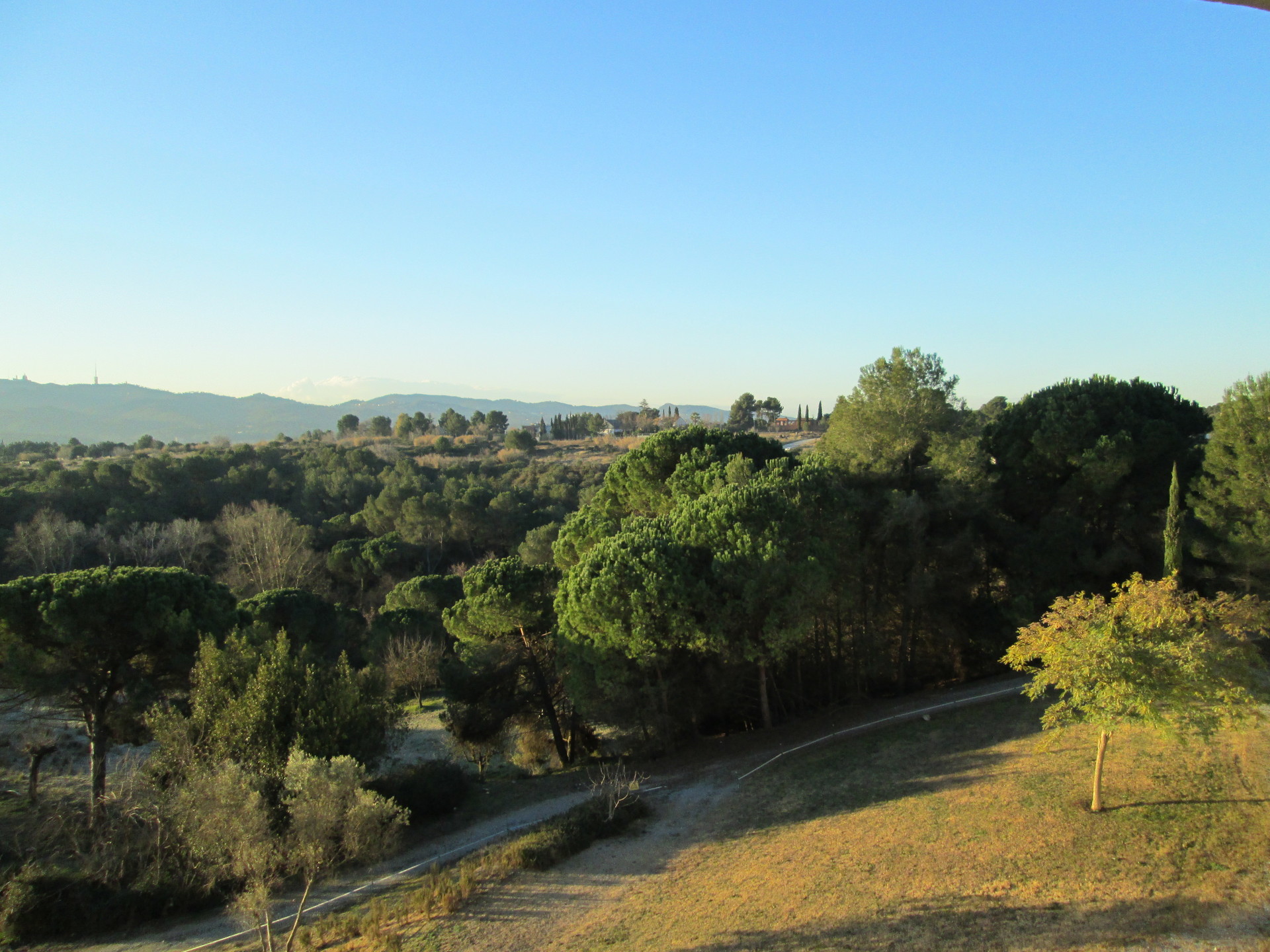
(The hills are alive... with the sound of the local goat herd)
Bella Terra itself is a tiny village consisting of a Condis supermarket (again, surprisingly well-stocked for a Catalan village), a hair dresser’s, a pet supplies shop, a bakery, a gym (not the university one) and a travel agent. Quaint, yes. But when summer hits and the hot streets of the city centre are packed with sweaty tourists and mosquitoes, the comparatively cool mountain air of Bella Terra and its wide streets and sweetness will be a blessing.
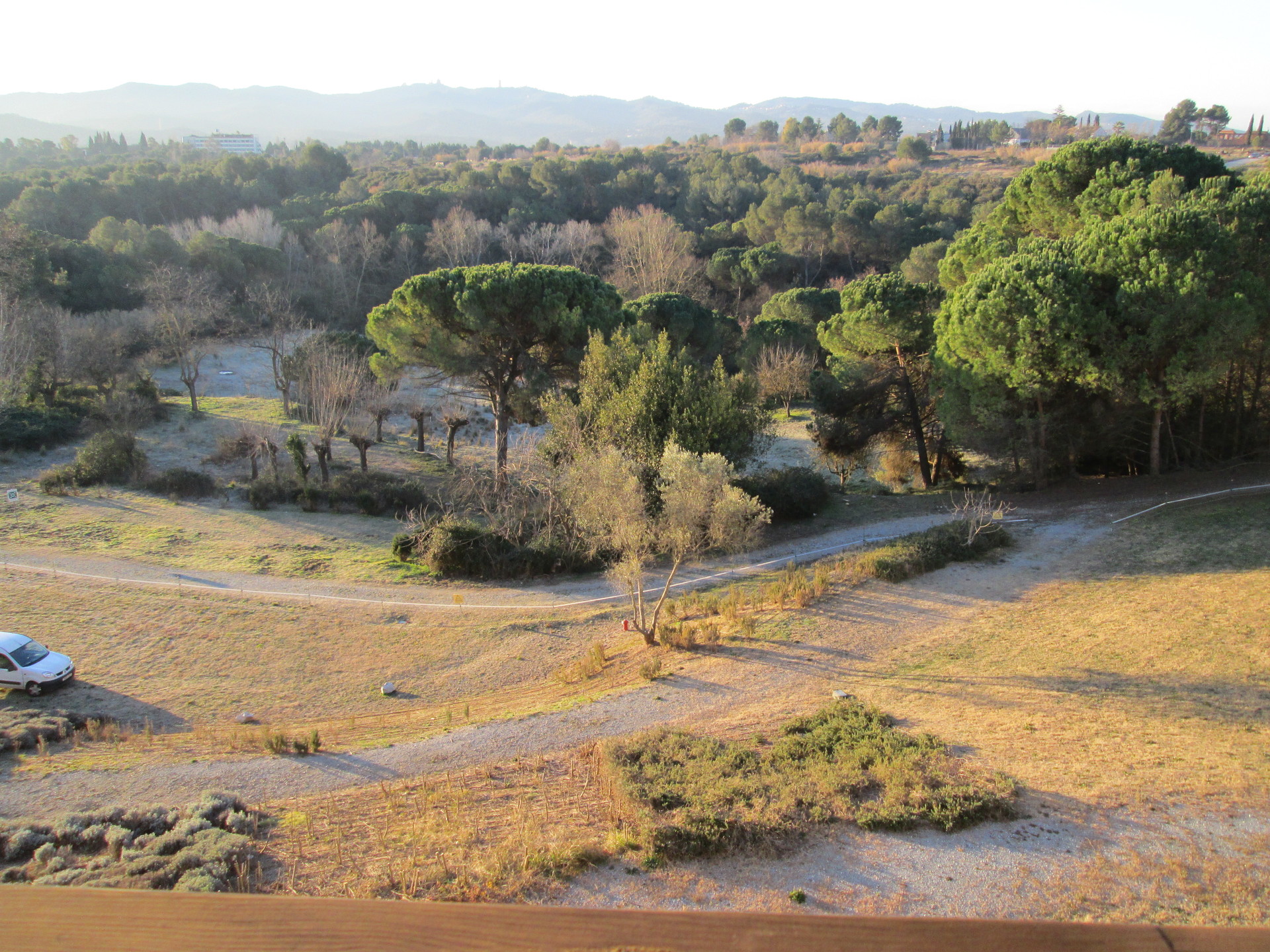
(Can you feel the fresh air? )
Note: Remember to get your deposit back from the office at the end of your stay! I very nearly forgot to pick it up (it was paid back in cash). It was only finding the form stating it which reminded me - the day before our early morning flight back and half an hour before the office closed for the day! Learn from my near-mistake, please.
Registration and matriculation
Moving in was the easy part; then came the registration. I will warn you now: bureaucracy at the UAB is not a smooth and simple process. I once described it as what the tenth circle of purgatory would have looked like if Dante had ever written one. Page after page of forms to fill out, then get stamped and signed by one office and another, which are often on separate sides of the campus. The process also has to be repeated at the end of the semester, when everything needs to be approved by the course director or some such; mine had taken the well-timed decision to leave for a week just when a department’s worth of international students needed their signature.
I had been warned beforehand that the university was not one for hand-holding through the academic and bureaucratic processes, and that warning was proven correct several times. It was the worst part of studying there, but the good news is that it only takes up three days in total: matriculating at the university, registering for your modules a week later, and getting the stamp of approval at the end. Come prepared and bring originals and copies of everything: passport, acceptance letter or relevant correspondence, everything. Same goes for getting your NIE card.
Choosing your modules is not something done by a system online, where you pick what you like and the computer tells you if the combination is possible; you yourself have to make sure the modules choices fit, and make appointments with the gestion office to sort it out. I also discovered, having been told I could study anything within the faculty, that actually there were certain combinations that weren’t allowed (such as Introduction to Translation B-A and then Translation B-A); I wasn’t told that before choosing, of course, but only after I had painstakingly worked out a timetable and gone to the office in person. Back to the drawing board. Expect unhelpful receptionists, surly office workers and general frustration. Oh, and if you want to study a third language (such as French for translators, if your native language is English and second language is Spanish, for example), you will need a letter from a lecturer at your home university confirming that is necessary for your studies.
Then when it is done, go home and pour yourself a large drink (or cut yourself a slice of cake, if that’s your thing) as a reward.
Studying
Once all the stress of matriculating is over, that’s when you can actually start studying. My favourite module had to be Translation A-B (Spanish to English); for the vast majority of the class, that meant translating from their native language into their target language. For me, it meant translating into my native language. My lecturer was called Berni Armstrong, and he was very lively and entertaining, and open to discussion (a rare quality in my experience of the Spanish education system). In addition to being an enjoyable class which helped me to improve my translation techniques, I even learnt a few new things about English grammar. Another lecturer called Deborah also teaches the same class, and she was very friendly, although her attitudes towards translation were very different to Berni’s: his priority was conveying the gist of the text, ensuring cultural references were understandable from country to country, and sometimes editing unnecessary repetitions; she was adamant that it was vital to stay totally faithful to the text, regardless of whether the original would make sense to someone from another culture. Two respectable stances, although they would create very different final translations.
Jumping straight from my highest graded class of the term to my lowest: History of Translation. I have no doubt in my mind that the class was very interesting. I love history. However, I made a fundamental error by choosing a final year class taught in Catalan when my own level of Catalan was just above A2 at the time. The teacher herself seemed very sweet and passionate about her subject, but unfortunately for me this passion was expressed by speaking with the speed and energy of a Duracell bunny on cocaine. As a result of these factors, I probably understood about a third of what was going on in the class; my notes reflect this quite well. To look at my pages of notes, one would see half-finished sentences and shorthand written in a combination of English, Catalan, Spanish and even French, if that was the first word my brain grasped for in the mental process between listening and writing. The tests were very true to the Spanish style of education: write this down, read these books, memorise them, regurgitate them (no balanced arguments or critical analysis necessary). My test results reflected perfectly that I didn’t understand enough to sufficiently memorise anything word for word … I think over all I got about 3 out of 60 over the three tests. On the bright side, the UAB doesn’t do negative marking in the style of some other universities, so it could have been much worse.
One of my greatest issues with the Spanish education system is the attitude towards learning that I mentioned above. At my home university, we were taught to read texts, think about what it is trying to say and how, consider its influences and why it might have been written that way or reflected that opinion, and form arguments based on our critical analysis of these texts and surrounding factors. This process - absorbing, analysing, learning to think for oneself and defending arguments with supporting evidence and sources - is not something I often came across during my time in the UAB. It essentially came down to memorising something parrot-fashion for just long enough to be able to repeat it in the exam. It might work for them, but this lack of independent thought and criticism bothers me. I have even come across one or two Spanish lecturers in the UK who obviously studied in that fashion and expected their classes to do the same. But I believe fresh perspectives, fresh arguments with valid points, are important factors for progress, creativity and growth; a lot more so than just rewriting the opinions of others. Rant over.
Now, French was a bit different. I love learning languages, and French is one of my favourites. To practice French pronunciation, we memorised the poetry of Verlaine and Baudelaire, and a song by Serge Gainsbourg – now that’s the kind of parrot fashion I can get on board with. The class had two teachers, one French and one Catalan. The former was Rubenesque and down to Earth, helped you feel more comfortable chatting in French and discussed contemporary issues and news stories; the latter was a lot stricter (I once used the wrong preposition and she said she couldn’t understand me because ‘I wasn’t speaking French’), but still got results. So it depends what floats your boat as to which teacher you would prefer. But overall, it was an interesting and useful class!
Hobbies
The vila universitària, or halls of residence, ran a lot of evening activities and classes: hip hop, yoga, guitar, etc. I chose to try guitar classes, seeing that the class was described as for beginners and in Spanish. However, since I was the only non-Catalan person there and the only person without experience playing the guitar, it ended up being an intermediate class taught in Catalan. The bright side was that I got a lot of chord sheets for popular songs, and the students there were really friendly. I can’t promise my guitar-playing improved much (I got better results teaching myself using internet tutorials), but I did make a couple of friends, and it was something to do on a Monday evening. So if you are looking to make friends outside of traffic light parties – something I had never heard of before living at the UAB – I do recommend picking a class and trying it out. They’re reasonably priced and you already have a common interest with anyone you meet there.
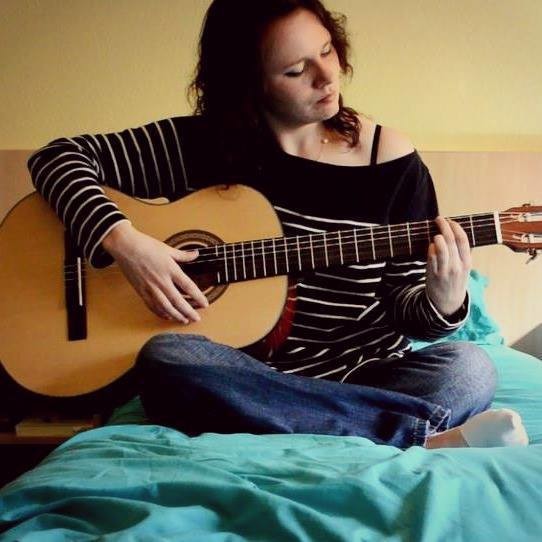
(Playing my guitar - probably with far more enthusiasm than skill)
I also spent a lot of time at the gym’s swimming pool, which I briefly mentioned above. The pool itself was spacious and had several single lanes, which are perfect for preventing you from veering off course and crashing into someone going in the opposite direction. Often, it was peaceful enough to get a lane per person, although the couple of times it was busier and we had to double up, there was still enough space to prevent it being inconvenient. Swimming was probably my favourite activity at the university, to the point that I went four times a week. I probably would have lost weight, but the discovery of the pool kind of coincided with my discovery of banana pancakes, which I would then make as a treat for having gone swimming. I might not have washboard abs, but the swimming was fun and the pancakes were delicious, so I guess it all worked out in the end.
Conclusion
My time spent in Bella Terra was one of the happiest periods of my adult(ish) life; the flat was ideal, the location was perfect, and I could swim and run to my heart’s content. Once I figured out how to use the hob and could cook for myself, I was very content living there. There are various clubs and groups available to join, or it is a great place to enjoy your own company and relax; plus, the city is less than forty minutes away.
The university had some wrinkles, some to do with the education system in general and some specific to the UAB. A benefit of the chaotic administration there was that I learnt how to be very organised very quickly; when it feels like you are in Bedlam and people aren’t as helpful as you’d like, you have no choice but to take the reins and figure things out for yourself. That leaves you with good skills for the future. I am also grateful to the university for giving me the opportunity to live in Catalunya for the first time; it stoked my love of Barcelona, and inspired me to go back after my degree. I also gained some great friends and great memories to boot!
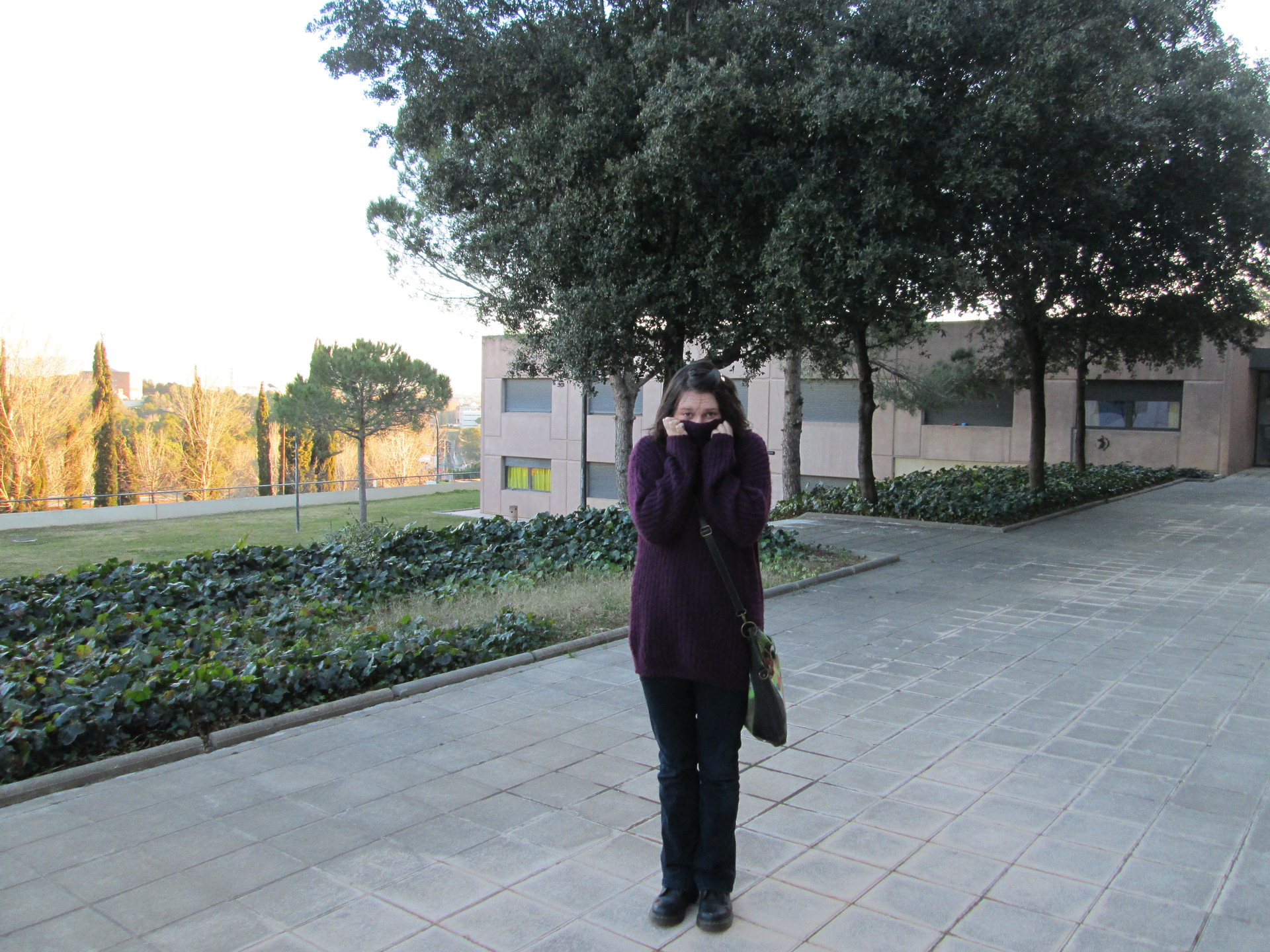
(Outside my building on the day I moved in! The start of a great semester)
Does this university seem great to you? If you want to see how cheap it can be to study here, check out this article.
Photo gallery
Content available in other languages
- Español: Reseña de la UAB
- Polski: Moja recenzja UAB
- Italiano: La mia esperienza alla UAB
- Français: Mon expérience à l'université autonome de Barcelone
Want to have your own Erasmus blog?
If you are experiencing living abroad, you're an avid traveller or want to promote the city where you live... create your own blog and share your adventures!
I want to create my Erasmus blog! →






















Comments (0 comments)